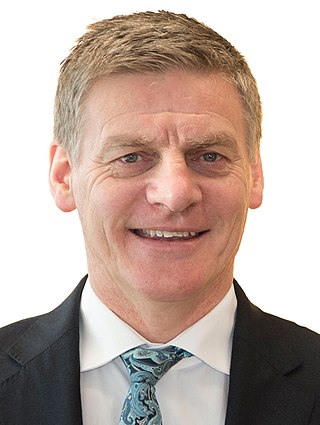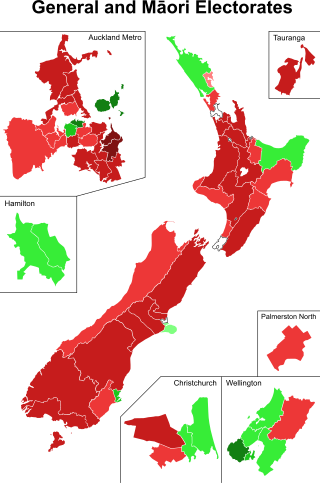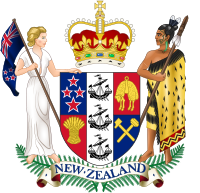
Michael King is a New Zealand mental health advocate, television personality, and former comedian.
The Fourth Labour Government of New Zealand governed New Zealand from 26 July 1984 to 2 November 1990. It was the first Labour government to win a second consecutive term since the First Labour Government of 1935 to 1949. The policy agenda of the Fourth Labour Government differed significantly from that of previous Labour governments: it enacted major social reforms and economic reforms.

The Third Labour Government of New Zealand was the government of New Zealand from 1972 to 1975. During its time in office, it carried out a wide range of reforms in areas such as overseas trade, farming, public works, energy generation, local government, health, the arts, sport and recreation, regional development, environmental protection, education, housing, and social welfare. Māori also benefited from revisions to the laws relating to land, together with a significant increase in a Māori and Island Affairs building programme. In addition, the government encouraged biculturalism and a sense of New Zealand identity. However, the government damaged relations between Pākehā and Pasifika New Zealanders by instituting the Dawn Raids on alleged overstayers from the Pacific Islands; the raids have been described as "the most blatantly racist attack on Pacific peoples by the New Zealand government in New Zealand’s history". The government lasted for one term before being defeated a year after the death of its popular leader, Norman Kirk.

The Fifth Labour Government of New Zealand was the government of New Zealand from 10 December 1999 to 19 November 2008. Labour Party leader Helen Clark negotiated a coalition with Jim Anderton, leader of the Alliance Party. While undertaking a number of substantial reforms, it was not particularly radical compared to previous Labour governments.

The New Zealand budget for fiscal year 2013/14 was presented to the New Zealand House of Representatives by Finance Minister Bill English on 16 May 2013. This was the fifth budget English has presented as Minister of Finance.

The 2017 New Zealand general election took place on Saturday 23 September 2017 to determine the membership of the 52nd New Zealand Parliament. The previous parliament was elected on 20 September 2014 and was officially dissolved on 22 August 2017. Voters elected 120 members to the House of Representatives under New Zealand's mixed-member proportional (MMP) voting system, a proportional representation system in which 71 members were elected from single-member electorates and 49 members were elected from closed party lists. Around 3.57 million people were registered to vote in the election, with 2.63 million (79.8%) turning out. Advance voting proved popular, with 1.24 million votes cast before election day, more than the previous two elections combined.

Nicola Valentine Willis is a New Zealand politician with a background in English literature and journalism. She is currently deputy leader of the National Party and in November 2023 was appointed minister of Finance in a coalition government with ACT and New Zealand First. Willis entered the New Zealand Parliament in 2018, when she inherited Steven Joyce's seat in Parliament as the next on the party list after his retirement from politics.

The Sixth Labour Government governed New Zealand from 26 October 2017 to 27 November 2023. It was headed first by Jacinda Ardern and later by Chris Hipkins, as Labour Party leader and prime minister.

The 2020 New Zealand cannabis referendum was a non-binding referendum held on 17 October 2020 in conjunction with the 2020 general election and a euthanasia referendum, on the question of whether to legalise the sale, use, possession and production of recreational cannabis. It was rejected by New Zealand voters. The form of the referendum was a vote for or against the proposed "Cannabis Legalisation and Control Bill". Official results were released by the Electoral Commission on 6 November 2020 with 50.7% of voters opposing the legalisation and 48.4% in support.

The New Zealand budget for fiscal year 2018/19 was presented to the New Zealand House of Representatives by Finance Minister Grant Robertson on 17 May 2018.

Budget 2019, dubbed the Wellbeing Budget, was the name given to the New Zealand budget for fiscal year 2019/20 presented to the New Zealand House of Representatives by Finance Minister Grant Robertson on 30 May 2019. This was the second budget presented by the Coalition Government. Its release was complicated by the accidental publication of budgetary documents on a test website two days prior to its official release on 30 May, attracting significant media and public attention.

The 2023 New Zealand general election was held on 14 October 2023 to determine the composition of the 54th Parliament of New Zealand. Voters elected 122 members to the unicameral New Zealand House of Representatives under the mixed-member proportional (MMP) voting system, with 71 members elected from single-member electorates and the remaining members elected from closed party lists. Of the 72 electorates, only 71 seats were filled, with the remaining electorate MP determined in the 2023 Port Waikato by-election, due to the death of one of the general election candidates. Two overhang seats were added due to Te Pāti Māori winning six electorate seats when the party vote only entitled them to four seats, with an additional overhang seat added after the by-election making for 123 members of parliament.

The 53rd New Zealand Parliament was a meeting of the legislature in New Zealand. It opened on 25 November 2020 following the 17 October 2020 general election, and dissolved on 8 September 2023 to trigger the next election. It consisted of 120 members of Parliament (MPs) with five parties represented: the Labour and Green parties, in government, and the National, Māori and ACT parties, in opposition. The Sixth Labour Government held a majority in this Parliament. Jacinda Ardern continued as prime minister until her resignation on 25 January 2023; she was succeeded by Chris Hipkins.

Budget 2020, dubbed "Rebuilding Together", was the New Zealand budget for fiscal year 2020/21 worth NZ$50 billion, presented to the House of Representatives by Finance Minister Grant Robertson on 14 May 2020, the third budget presented by the coalition government of 2017–2020. This budget occurred during the COVID-19 pandemic in New Zealand and on the same day that the country exited the lockdown brought about by alert level 3.
Te Aka Whai Ora was an independent New Zealand government statutory entity tasked with managing Māori health policies, services, and outcomes. The agency was one of four national bodies that oversaw New Zealand's health system since 2022, along with the Ministry of Health, the Public Health Agency, and Te Whatu Ora. They replaced a system in which a single Ministry funded services through 20 district health boards (DHBs).

Budget 2022, dubbed the Wellbeing Budget 2022, is the New Zealand budget for fiscal year 2022/23, presented to the House of Representatives by Finance Minister, Grant Robertson, on 19 May 2022 as the fifth budget presented by the Sixth Labour Government. This budget was released in the midst of socio-economic impacts of the widespread community transmission of the SARS-CoV-2 Omicron variant, rising living costs, and the 2022 Russian invasion of Ukraine.

Budget 2023, titled "Support for today, Building for tomorrow", is the New Zealand budget for fiscal year 2023/24 presented to the House of Representatives by Finance Minister, Grant Robertson, on 18 May 2023 as the fifth budget presented by the Sixth Labour Government. The budget was released in the midst of rising living costs and recovery efforts following the 2023 Auckland Anniversary Weekend floods and Cyclone Gabrielle in January and February 2023.

The 2023 New Zealand mini-budget, also known as Mini Budget 2023, was released by Minister of Finance Nicola Willis on 20 December 2023 as part of the Sixth National Government's plan to address the cost of living, deliver income tax relief, and reduce the tax burden. The Government's mini-budget delivered NZ$7.47 billion in operational savings by repealing or stopping 15 programmes launched by the previous Labour Government including 20 hours of free child care for two-year olds, eliminating depreciation for commercial buildings and dissolving the Climate Emergency Response Fund.

The first term of the Sixth Labour Government of New Zealand lasted between 2017 and 2020. It was formed on 19 October 2017 following coalition agreements between the Labour, Green and New Zealand First parties. Three years later, Labour won a landslide victory in the 2020 general election and was returned for a second term.

Budget 2024 is the New Zealand budget for fiscal year 2024/25 presented to the House of Representatives by Minister of Finance, Nicola Willis, on 30 May 2024 as the first budget presented by the Sixth National Government, ignoring the mini-budget they presented in December 2023.











